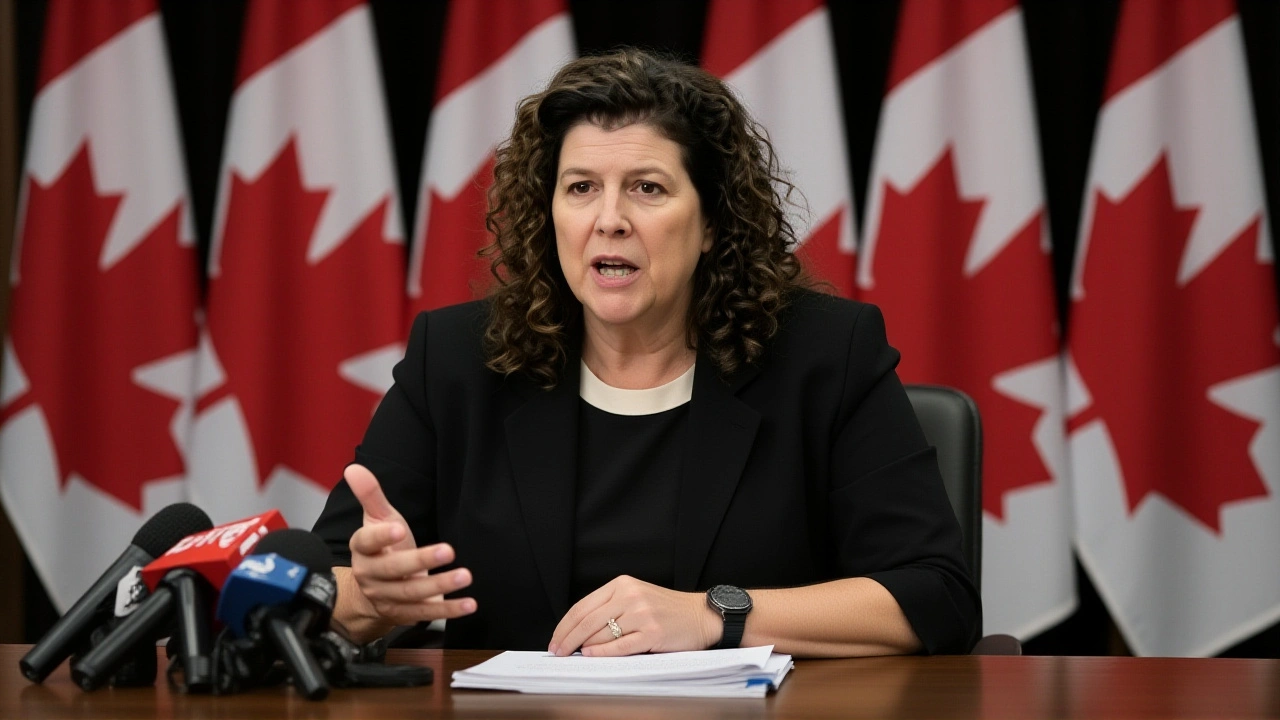When Helena Lindberg, Auditor General of Riksrevisionen released her seven‑year retrospective in the INTOSAI Journal, the message was clear: the old guard of audit can’t stay still while the world races ahead.
In a sweeping 45‑page analysis published on 15 November 2024, Lindberg maps the shifting terrain that Supreme Audit Institutions (SAIs) must navigate—from AI‑driven data analytics to the relentless pressure of climate accountability. She draws on her tenure at Sweden’s national audit office, a period marked by rapid digitisation, heightened scrutiny of public spending, and an unprecedented global push for sustainable governance.
Background: SAIs and Global Governance
The role of SAIs—independent bodies tasked with scrutinising government finances and performance—has long been anchored in the principle of independence. In Sweden, the legal framework guarantees Riksrevisionen operational autonomy, shielding it from political meddling.
That independence gained fresh spotlight on 19 December 2024, when the United Nations General Assembly adopted Resolution 79/231New York. The resolution, a first for the UN, formally recognised SAIs as essential actors in the fight against climate change, urging member states to heed audit findings when shaping climate policy.
Helena Lindberg’s Seven‑Year Review
Lindberg’s report underscores three pillars of modern audit work:
- Digital transformation: Riksrevisionen has invested in data‑analytics platforms, artificial‑intelligence tools, and even pilot projects using blockchain to verify public‑procurement chains.
- Security and privacy safeguards: while technology unlocks new insights, it also raises the stakes for data protection, a concern Lindberg flags as "the new frontier of audit risk."
- Strategic foresight: applying scenario‑planning methods to anticipate climate‑related fiscal pressures.
"Our audits are no longer about ticking boxes; they’re about asking the right questions before the crisis hits," Lindberg told the journal. She points to a 2023 pilot where AI‑driven anomaly detection identified a €12 million over‑run in a coastal‑defence procurement, prompting corrective action before the funds were exhausted.
UN Resolution 79/231 and Its Significance
The Brazilian delegation, led by its Permanent Mission to the UN, championed the resolution with backing from the International Organization of Supreme Audit Institutions (INTOSAI) and 48 other nations. The text calls on governments to integrate SAI climate‑audit reports into national climate‑action plans, effectively turning audit findings into policy levers.
Analysts note that the resolution builds on earlier UN texts—A/66/209 (2011), A/69/228 (2014) and A/69/327 (2015)—which progressively widened the accountability lens from transparency to sustainability. "It’s a legal reinforcement that audit isn’t a side‑show; it’s central to the climate agenda," said Dr. Maya Svensson, senior fellow at the Swedish Institute of International Affairs.
Digitalisation and Climate Focus at the Tbilisi Summit
The ideas crystallised at the Global Summit on SAI Audits Contributing to Digitalisation and Sustainability, held 18‑19 November 2024 in Tbilisi, Georgia. Hosted by SAI Georgia and the INTOSAI Development Initiative, the two‑day event attracted over 300 virtual and nearly 100 in‑person participants from 30 countries.
In his opening remarks, Tsotne Kavlashvili, Auditor General of SAI Georgia, warned that "the pace of digital change is outstripping regulatory frameworks, and SAIs must be the bridge between innovation and accountability."
Later, Bruno Dantas, chair of INTOSAI and President of SAI Brazil, urged members to "amplify the global voice of SAIs to tackle cross‑border challenges like climate change and data sovereignty."
Panelist Farahnaaz Khakoo‑Mausel highlighted that audit is no longer just about checking numbers; it must ensure that emerging technologies are deployed ethically and equitably.

World Bank’s Reliance on SAI Audits
In a parallel session, Edward Olowo‑Okere, Global Director of Governance Global Practice at the World Bank, disclosed that more than 40 % of the Bank’s investment‑lending portfolio now leans on SAI audits to verify the use of public funds in client countries.
"When a country’s Supreme Audit Institution validates a climate‑resilience project, it gives the Bank the confidence to release financing," Olowo‑Okere explained. He added that the Bank is piloting a joint‑audit framework that aligns World Bank performance metrics with SAI findings, a step that could reshape how development financing is monitored.
Future Outlook: Strategic Foresight and Sustainability
Looking ahead, Lindberg proposes a six‑step foresight framework for auditing the energy transition, especially in the electricity sector. The model blends trend‑analysis, scenario planning, and stakeholder mapping to pinpoint policy gaps before they become costly failures.
Such proactive auditing is gaining traction. A recent case study from Denmark showed that applying strategic foresight reduced the estimated cost overruns of offshore wind projects by €250 million over five years.
Ultimately, the convergence of digital tools, climate urgency, and stronger international recognition—embodied in UN Resolution 79/231—means SAIs are moving from watchdogs to strategic partners in national and global governance.
Key Facts
- Resolution 79/231 adopted by the UNGA on 19 December 2024, recognising SAIs in climate action.
- Swedish Auditor General Helena Lindberg marks seven years in office, emphasizing digital & climate audits.
- Global Summit in Tbilisi (18‑19 Nov 2024) gathered 300+ virtual attendees from 30 nations.
- World Bank relies on SAI audits for over 40 % of its investment lending.
- New six‑step foresight framework aims to future‑proof energy‑sector audits.
Frequently Asked Questions
How does UN Resolution 79/231 affect national climate policies?
The resolution urges governments to treat SAI climate‑audit reports as authoritative inputs when drafting or revising climate‑action plans. In practice, this means audit findings can trigger policy revisions, re‑allocation of funds, or new legislative proposals, giving audit bodies a direct line to climate‑policy decisions.
What digital tools are SAIs like Riksrevisionen adopting?
Riksrevisionen has deployed data‑analytics platforms that ingest millions of transaction records, AI models that flag irregular spending patterns, and blockchain pilots that create immutable trails for public‑procurement contracts. These tools aim to boost efficiency while enhancing audit transparency.
Why is the World Bank leaning on SAI audits for its loans?
SAI audits provide independent verification that loan‑funded projects comply with national budgeting rules and environmental safeguards. By using these audits, the World Bank reduces duplication of effort, lowers monitoring costs, and gains confidence that funds are used as intended, especially in climate‑resilient infrastructure.
What are the biggest challenges SAIs face in digital transformation?
Beyond technology acquisition, SAIs wrestle with data security, skill gaps among auditors, and the need to keep audit standards compatible with fast‑evolving tech. Lindberg warns that without robust privacy safeguards, digital audits could expose sensitive governmental data.
How can strategic foresight improve audit outcomes?
By mapping future scenarios—such as energy‑transition pathways—auditors can spot policy gaps early, recommend preventive measures, and align audit focus with emerging risks. The six‑step framework Lindberg proposes is already being piloted in Nordic electricity markets, showing measurable cost savings.

Trupti Jain
October 1, 2025 AT 17:32Helena Lindberg’s saga reads like a techno‑thriller where auditors wear capes and wield AI. The Swedish audit office is practically a startup hub, sprinkling blockchain dust over procurement like confetti. It’s refreshing to witness a public institution that actually embraces the digital age rather than trembling at its heels. The climate‑audit push feels like a necessary plot twist in the grand drama of governance.
deepika balodi
October 13, 2025 AT 03:08The UN’s nod to SAIs gives them a louder voice in climate policy. It’s a neat bridge between numbers and the planet.
Priya Patil
October 24, 2025 AT 12:44Reading about the six‑step foresight framework reminded me of a coach’s game plan. Auditors now sketch scenarios like a chess player thinking several moves ahead. By flagging risks before they explode, they save taxpayers a lot of headache. It’s a proactive vibe that matches the urgency of the energy transition. Keep pushing those strategic tools, the sector needs it.
Rashi Jaiswal
November 4, 2025 AT 21:20Totally agree its like audit 2.0, super cool!
Maneesh Rajput Thakur
November 16, 2025 AT 06:56Let’s break this down piece by piece so everybody can follow the logic. First, the UN resolution isn’t just a decorative badge; it fundamentally reshapes how governments must treat audit findings. When a Supreme Audit Institution flags a climate‑related overspend, that data point can trigger a legislative amendment faster than a typical parliamentary debate. Second, digitisation supplies the raw material for those flags – massive data sets, AI‑driven anomaly detection, and blockchain ledgers that make tampering practically impossible. Third, the Swedish model showcases a pragmatic approach: invest in robust analytics platforms while simultaneously hardening data security, because without privacy safeguards the whole system collapses under suspicion. Fourth, the strategic foresight framework Lindberg proposes mirrors what the private sector calls scenario planning, yet it’s tailored to public finance, projecting fiscal pressures from renewable roll‑outs, grid upgrades, and climate‑resilient infrastructure. Fifth, the World Bank’s reliance on SAI audits for over 40 % of its lending portfolio demonstrates a confidence that these institutions can deliver independent verification, reducing duplication of monitoring efforts. Sixth, this alignment creates a feedback loop – auditors produce insights, banks fund projects, and successful projects feed back as positive audit outcomes, reinforcing the cycle. Seventh, the Tbilisi summit acted as a catalyst, gathering over 300 virtual participants, proving that the SAI community is not only aware of the digital shift but also eager to collaborate. Eighth, the Brazilian delegation’s advocacy for the resolution shows that emerging economies see audit as a lever for climate justice, not just fiscal prudence. Ninth, the pilot in Denmark that saved €250 million on offshore wind proves that early audit intervention can translate into real‑world savings. Tenth, the mix of AI, blockchain, and foresight tools creates a triad of capability that future‑proofes public spending against techno‑regulatory lag. Eleventh, the security frontier that Lindberg warns about is the one most governments ignore until a breach forces costly remediation. Twelfth, adopting these technologies can also democratize data, allowing civil society to peek behind procurement curtains without exposing sensitive details. Thirteenth, the cultural shift from “checking boxes” to “asking the right questions early” redefines the auditor’s role from watchdog to strategic partner. Fourteenth, these changes demand upskilling the audit workforce, a challenge that many institutions are still grappling with. Fifteenth, if the momentum continues, SAIs will become indispensable actors not just in national budgets but in global climate governance, shaping policies before crises unfold.
ONE AGRI
November 27, 2025 AT 16:32Honestly, the whole digital transformation hype sometimes feels like a circus where everyone is juggling data, security, and climate pressures all at once. While I applaud Sweden’s bold steps, I can’t help but wonder if smaller audit offices will have the bandwidth to keep up without turning into data‑driven nightmares. Still, the push for strategic foresight is a promising antidote to the chaos, provided the auditors don’t get lost in the weeds of tech jargon.
Himanshu Sanduja
December 9, 2025 AT 02:08Nice work!
Kiran Singh
December 20, 2025 AT 11:44🚀 This is the future of audit, love seeing AI on the frontline! 👍
Balaji Srinivasan
December 31, 2025 AT 21:20The fact that auditors are now part of climate policy discussions feels like a natural evolution. It bridges the old world of numbers with the new urgency of sustainability.
Hariprasath P
January 12, 2026 AT 06:56i think its a bit overblown but ya, audit tech sounds cool.